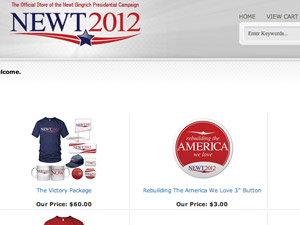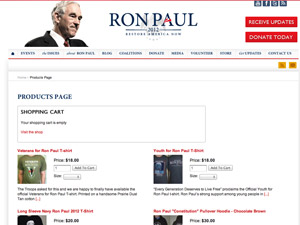Political campaigns, like most organizations, are constantly seeking out new sources of funds and innovative marketing efforts. With the political season gearing up many candidates in the local, state and even Presidential arena are using web stores to generate funds and increases awareness. This is a BIG opportunity for those of you who can offer web stores!
Political campaigns are increasingly taking on the tone of the Home Shopping Network. Offering people the opportunity to proudly display their devotion to a candidate…
Examples:
[divider] [/divider]
This article that showcases the opportunity well.
WASHINGTON — For the politically minded holiday shopper, this season presents a cornucopia of options. Politicians of all stripes are offering backers a chance to purchase campaign-related swag. But few are doing it as brazenly as President Barack Obama.
For $20 the Barack Obama reelection campaign will sell you a soy candle, a cutting board or a baby onesie. For five bucks more, you can get a pint glass or golf ball set, each with the Obama campaign insignia. For $35 you can buy yoga pants with a “2012” print down the right leg. For $65, there is the tailgate pack, replete with an apron bearing the message, “Fired up and ready to grill.” And a “limited-edition” rhodium ball ornament is being offered for $40, just in time for the holidays. The website declares that it will “really stand out,” in addition to being “a great companion to [the campaigns] glass ornament set.” For good measure, the campaign offered free shipping on Black Friday ““- “Skip the lines today,” the Obama for America email read — and $5 purchases during Cyber Monday.
Political campaigns are increasingly taking on the tone of the Home Shopping Network. Offering people the opportunity to proudly display their devotion to a candidate, they push overpriced and generally poor quality goods on willing purchasers. In the end, however, it’s the candidate who gets the gift: stuffed campaign coffers and the ability to pad the number of “small donors” he or she is able to report.The use of merchandise as a fundraising tool didnt start with Barack Obama, but he certainly popularized it during his 2008 run for office. Hoping to show extensive grassroots support, the Illinois Democrats fundraising team counted sales of items like bumper stickers and key chains as individual contributions. The goal was not simply to capitalize on a popular brand, but to make voters feel like they were literally invested in a movement. Half-a-year after the campaign ended, the Wilburforce and Brainerd Foundations both philanthropic entities focusing on political and environmental activism released a report that assessed the impact merchandise sales had had on the campaign.”The campaign extensively tested premiums a small merchandise item in association with a donation. These premiums ranged from mugs to t-shirts to car magnets, and they proved to be very lucrative, according to new media staff,” the foundations concluded.




